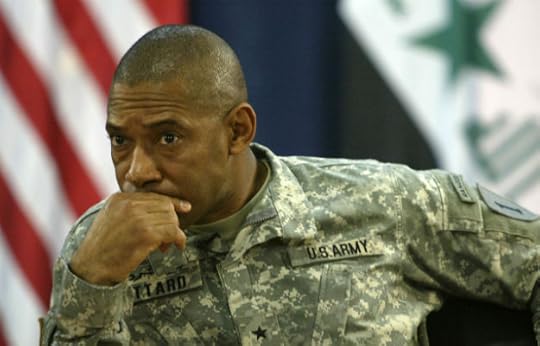A Memorial Day thought: Maybe Pittard really does speak for us on suicides

By Jim Gourley
Best Defense no. 1
commenter
There is profound irony in the recent unfortunate
remarks made by Major General Dana Pittard the week before Memorial
Day. After attending the funeral service of a
soldier who'd committed suicide, the 1st Armored Division commander issued a
post on his official blog describing suicide as "an absolutely selfish
act."
"I am personally fed up with soldiers who are choosing to take their own
lives so that others can clean up their mess." He wrote. "Be an adult, act like an adult, and
deal with your real-life problems like the rest of us."
Pittard later retracted
his statements with "deepest
sincerity and respect," but he did not explicitly apologize. Just as notable was the absence of any
remarks from senior army leadership disavowing that Pittard's comments in any
way represent official army policy or views. Perhaps it would have mitigated the damage done by the ill-conceived
remarks, but the fact that no one said anything -- especially so close to a time
when we are about to remember those who have made the ultimate sacrifice in
service to their country -- may in fact be the bitter medicine we need to
take.
The truth is that Pittard's comments actually do serve as a
representation of the military's perception and approach to suicide in an
indirect yet disturbing way. The remarks
themselves were odious, but the loudest statement was the muted response from
army leadership. It is incredible that,
after a decade of war in Afghanistan, it was unclear to Pittard that such views
are not only unacceptable but wholly incorrect. It is equally shocking that no other senior leader felt compelled to
issue an immediate and damning response. It is not the case that Pittard's remarks are generally accepted as
correct (though more than one senior leader likely agrees with them), but it is
painfully evident that senior leaders have not determined what the correct
perspective is. They certainly have not
articulated it.
On the whole, Americans take off work for Memorial Day but they don't
actually take the time to remember. We
visit cemeteries and monuments to talk about the price of freedom, but we don't
reflect on the cost of war. We hail
those who made the ultimate sacrifice, but we don't consider how to account for
the sacrifices of those who died by their own hand. It is a bureaucratic bridge too far for the
army to ever establish a connection between combat events and an active duty
service member's suicide in garrison, let alone the suicide of a veteran after
separation. Yet countless are the
mothers, fathers, spouses, and children who will say that these men and women
"died over there" and "never really came home." That leaves us with the prospect that this
weekend we'll remember fewer than ten
percent of the service members who made the ultimate sacrifice over the
last ten years. It's not something we
like to talk about. So we don't.
This irony will be the enduring, tragic legacy of our wars in
Afghanistan and Iraq. I have written
about the issue at length on this blog.
The Department of Defense, VA, and multiple independent researchers have
made an exhaustive effort out of collecting data on combat trauma and
suicide. Yet for all the statistical
certainty with which we can speak about suicide among veterans and service
members, we are paralyzed when it comes to determining how we feel about it as
a country. The people we've lost to
suicide knew how they felt when they joined the military. It's reasonable to assume most of them did
not feel selfish. They definitely knew
how they felt the moment they took their own lives.
The Pittard episode is an allegory for America's response to service
member and veteran suicide. I neither
believe him nor the majority of American citizens to be malevolent. Nor do I believe that the thoughts he
expressed were motivated by cruelty. But
cruelty does not require intent, and it is often the consequence of a
neglectful or inconsiderate mindset.
Having committed it accidentally, we view the cruelty as something best
forgotten quickly. Pittard did exactly
that, trying to move on without dwelling further on the past. He immediately followed his retraction with
comments about this weekend's upcoming Memorial Day events at Fort Bliss,
seemingly oblivious to any connection between the two. Like anyone else caught in a public gaffe,
Pittard would like to carry on as if nothing happened.
In this way, he is the avatar for our collective discomfort with our
treatment (or lack thereof) of those living with combat trauma. With the exception of a few landmark
occasions like Memorial Day and September 11, this has been the
standard practice of Americans for the last ten years. How ironic then that we should refer to
combat trauma as an "invisible wound" and over 6,000 veteran suicides
each year as the "unseen tragedy."
In that way, a nation's day of remembrance would take on an unbearable
melancholy were its citizens brought to remember that the preponderance of its
fallen service members died on home soil. By living in denial we protect the greater population from bearing that
burden of remembrance. Therein lies the final irony of Pittard's remarks. Any rebuke of his momentary lapse in judgment
would necessarily be an indictment of our decade of willful negligence. Maybe the senior leadership was hesitant to
say that he does not speak for us because they know that he speaks from among
us. In that regard, our silence is bred
of shame.
Thomas E. Ricks's Blog
- Thomas E. Ricks's profile
- 436 followers



